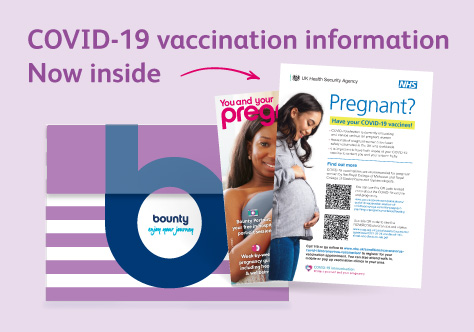Putting COVID-19 vaccination information into the hands of pregnant women
Reaching 40,000 pregnant women every month

Starting this month, Bounty is working with the UK Health Security Agency (UKHSA, formerly Public Health England) to help put vaccination information directly into the hands of pregnant women.
Information is included inside the Bounty Pregnancy Information folder and the ‘You & Your Pregnancy’ magazine.
Thanks to the amazing support from midwives, who are handing out our Pregnancy Information Folders, this vital information, will reach 40,000 pregnant women, every month.
The NHS is encouraging pregnant women to get the COVID-19 vaccine as new data shows that nearly 1 in 5 (20%) of the most critically ill COVID patients are pregnant women who have not been vaccinated*. The UKHSA, says:
The COVID-19 vaccines are one of the best defences against COVID-19 infection. Severe illness from COVID-19 in pregnancy is uncommon, however, hospital admission and severe illness may be more common in pregnant women than in women of the same age who are not pregnant. Women with COVID-19 disease are more likely to have their babies early than women without COVID-19.
UK Health Security Agency UKHSA (formally Public Health England) information is now included inside of the Bounty Pregnancy Information folder and the ‘You & Your Pregnancy’ magazine, given around the time of the first booking-in appointment. This promotes the need for two doses of COVID-19 vaccine, ideally before the last trimester to give the best protection to women and their pregnancy.
Putting vaccine information straight into the hands of pregnant women will also help guide those who have questions or concerns to speak to their midwife - who will help them make the right decision for them and their baby.
The UKHSA continues to work together with Bounty whose support and nationwide reach to pregnant women will help deliver this important public health immunisation campaign.
Hospitalised mum-to-be shares her experience of the virus to help encourage other mums-to-be to get the vaccine
In July, Claire Bromley, 33, from Kent, spent nearly a month in an NHS critical care unit. She wants fellow pregnant women to be aware of the serious health risks that not having the vaccine poses to them and their unborn baby.
Claire said: “I completely understand the hesitation not to get vaccinated when you are growing a child inside you, and after experiencing two miscarriages before the pandemic, the fear of being pregnant again with the worry of COVID-19 was sending my anxiety through the roof.”
A few days after testing positive for COVID-19, Claire was admitted to her local hospital in Kent with difficulty breathing, where she was then put on a ventilator while in a medically induced coma.
Sadly, her condition deteriorated, Claire and her husband were told to prepare for the possibility of an emergency c-section at just 26 weeks into her pregnancy.
With her condition continuing to get worse, Claire was transferred to another hospital in London where the clinical team managed to ensure she did not need an early c-section.
Nearly a month after she was initially admitted to hospital, Claire was allowed to go home, where she is still recovering with her husband, and their unborn child, who is doing well.
Claire said: “But after what happened, I can honestly say that the risk of not having the vaccine far outweighs any doubts about having it.”
Claire is now urging other pregnant women to consider getting the vaccine to significantly reduce their risk of catching the virus and experiencing what she did.
What other experts say
England’s top midwife, Chief Midwifery Officer for England Jacqueline Dunkley-Bent, added: “This is another stark reminder that the COVID-19 jab can keep you, your baby and your loved ones, safe and out of hospital. You can receive vaccination at any time in pregnancy, but the risks that unvaccinated pregnant women face of becoming severely unwell if they COVID-19 show exactly why we advise you to do so as soon as possible”.
The Royal College of Obstetricians and Gynaecologists and the Royal College of Midwives have both recommended vaccinations as one of the best defences for pregnant women against severe COVID-19 infection.
Dr Edward Morris, President of the Royal College of Obstetricians and Gynaecologists, said: “We are urgently calling for all pregnant women to come forward for their vaccinations. There is robust evidence showing that the vaccine is the most effective way to protect both mother and baby against the possibility of severe illness from COVID-19. The disproportionate number of unvaccinated pregnant women in intensive care demonstrates that there is a significant risk of severe illness from COVID-19 in pregnancy.
"As we approach winter, we encourage eligible pregnant women to accept the offer of a COVID-19 booster jab. We also urge all pregnant women to have the flu jab this winter, which can be given alongside the COVID-19 vaccine. It is possible to get infected with flu and COVID-19 at the same time and this could make someone who is pregnant severely unwell."
Latest decision aid and information sheet from the Royal Colleges of Midwives (RCM) and Obstetricians & Gynaecologists (RCOG)
Vaccination is recommended in pregnancy, but the decision whether to have the vaccine is your choice. You may find this latest decision aid and information sheet from the Royal Colleges of Midwives and Obstetricians & Gynaecologists (RCOG) will help you to make a personal informed choice about whether to get the COVID-19 vaccine if you are pregnant.
* Source from NHS England and NHS Improvement website 11 October 2021